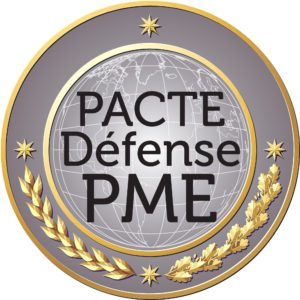
SME Defence Pact – The Richelieu Committee’s perspective
The SME Defence Pact, introduced on 27 November 2012 by the Minister of Defence Jean-Yves Le Drian, maintains a “flexible[1]” concept of defence. It meets the requirements of the new strategic situation by laying the foundations for the development of a responsive industry producing tailor-made solutions to threats. Its aim: prioritise the development of SMEs alongside large industrial groups and build a pact encouraging the growth of innovative solutions in weaponry, operational maintenance, infrastructure, energy, health, telecommunications, etc.
The ministry has further developed its procedures, wishing, more broadly, “to build, over the long-term, a genuine chain of partnerships between the various development stakeholders comprising SMEs, large industrial contractors, regional stakeholders and ministerial departments[2].”
The main thrusts of this plan are:
- Access to public procurement;
- Support for innovation;
- Financing;
- Providing export assistance.
The results
The minister presented the results of this SME Defence Pact at the DGA Innovation forum on 24 November 2016. The procedures have initially been adapted to improve access by SMEs and innovative technical companies to contracts. Direct payments to these companies have increased by 10% since 2013 to €2.7 billion in 2015. The average overall payment lead-time has been reduced by 50% since 2012, down to 23 days over the first nine months of 2016. Furthermore, the Ministry underwent an independent external audit of its practices in respect of its suppliers, as certain large companies have done. It has now become the first ministry to receive the label of “responsible supplier” awarded by the companies’ mediator. This label is proof of its long-term commitment to fostering responsible relationships with its 26,200 SME and innovative technical suppliers.
Strengthening the innovation chain
In terms of innovation, the SME Defence Pact strengthens the innovation chain. Upstream, the Astrid Maturation programme encourages the transfer of technologies from laboratories to SMEs. Further downstream, credits from the RAPID scheme supporting dual-use innovation by SMEs have been increased by 25% to €50 million per year since 2015. Lastly, the organisation of events such as the RAPID Club convention, in which the Richelieu Committee was one of the stakeholders, has given SMEs the opportunity to present their innovative projects to large groups and meet decision-makers and potential partners.
A regional approach
On a regional level, Defence Sector Regional Hubs have been created to facilitate access by SMEs to ministerial departments. More than 60 regional information meetings have been organised, involving over 5,300 SMEs. These meetings have enabled buyers from the Ministry of Defence and companies to interact regarding available opportunities and innovations.
As regards providing export guidance, “l’équipe France” (Team France) coordinated by the Minister of Defence has enabled the defence industry to achieve record export success, i.e. €16.9 billion in orders in 2015. This success will benefit the entire sector, from contractors to sub-contractors, as well as boosting jobs and the regions, while at the same time consolidating the technological and industrial capabilities of the defence sector.
Positive action to continue and conclude
The Richelieu Committee has, in its 2017 white paper, issued 15 concrete proposals[3] in support of innovative SMEs and the competitiveness and growth of the country. Within these proposals, the Committee wishes to ring-fence the “SME Defence Pact” and, in particular, one of the 40 key measures: the signature between the “Big Seven” and the State of bilateral agreements to combat the effects of the asymmetric purchasing policies of the large defence groups. The aim of these agreements is to sustain the supply chain and to create a stronger “Équipe France” capable of winning international contracts. Although we have had to wait two or three years to start seeing awareness of and improvements in the relationships between the “Big Seven” and the supply chain, it is crucial that work in this area continues.
[1] “Défense, PME, grands groupes, la fille de toutes les batailles”, by Arnaud Marois, Revue Défense Nationale no.796 – January 2017
[2] Ministerial Instruction on the SME Defence Pact – Jean-Yves Le Drian, Minister of Defence.
[3] The Richelieu Committee’s 2017 White Paper. http://old.comite-richelieu.org/wp-content/uploads/2013/06/livre-blanc-comit-richelieu-2017-vf.pdf
